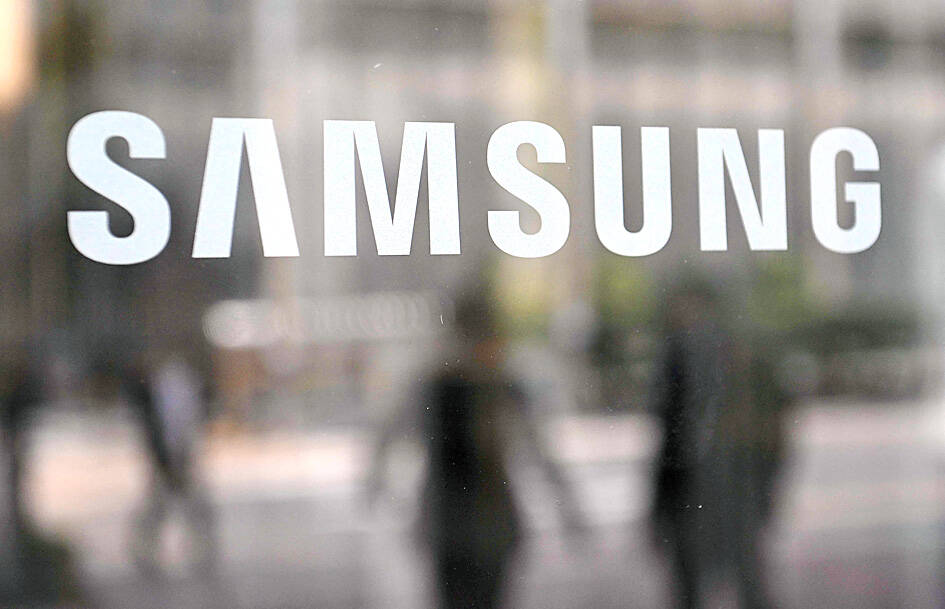Samsung Electronics Co yesterday issued a rare apology and acknowledged it was facing a “crisis” over its technological competitiveness, reflected in a disappointing profit guidance, despite a global artificial intelligence (AI) boom.
The company expects third-quarter profits to rise to 9.1 trillion won (US$6.8 billion), up 274.5 percent from a year earlier, but falling short of market expectations as the company struggles to leverage robust demand for the chips used in AI servers.
“Today, we, the management of Samsung Electronics, would like to first say sorry to you,” Samsung said in a statement signed by Jun Young-hyun, the vice chairman of its device solutions division.

Photo: AFP
“Concerns have arisen about our fundamental technological competitiveness and the future of the company” because of the results, it said.
“Our management will take the lead in overcoming the crisis... We will make the serious situation we are currently facing an opportunity for a resurgence,” it said.
The results are up about three-fold from the same period last year, but down nearly 13 percent from the previous quarter.
The rare apology came about a week after the tech giant said it intended to reduce staff in some of its operations in Asia, describing the move as “routine workforce adjustments.”
Bloomberg reported that the layoffs could affect about 10 percent of the workforce in those markets, while other reports claimed the planned move could affect up to 30 percent of overseas employees at some operations.
Samsung has been lagging behind South Korea’s SK Hynix Inc when it comes to high-bandwidth memory (HBM) chips used in AI chipsets, which could be one of the biggest causes of the profit estimate released yesterday, Sejong University business professor Kim Dae-jong said in Seoul.
“Given the circumstances, it appears that Samsung has also lost a significant number of [HBM-related] employees to SK Hynix,” Kim said.
The company is facing a “grave situation,” he added.
Samsung shares fell 1.15 percent in Seoul yesterday, with its stock down almost 30 percent over the past six months.
The Samsung statement said management would “quickly assess and make any necessary adjustments to our workplace culture.”
Counterpoint Research senior analyst Jene Park said there had been “an expected decline” in Samsung’s memory sector, with delays in supply of the newest chips and general reductions in memory demand.
Even so, a sharp profit or sales decline was unlikely in the near future, he said.
“Samsung plays a significant role in the global supply chain,” Park said.
The company sees third-quarter sales rising 17.2 percent year-on-year to 79 trillion won.
It is expected to release its final earnings report at the end of this month.

Hon Hai Precision Industry Co (鴻海精密) yesterday said that its research institute has launched its first advanced artificial intelligence (AI) large language model (LLM) using traditional Chinese, with technology assistance from Nvidia Corp. Hon Hai, also known as Foxconn Technology Group (富士康科技集團), said the LLM, FoxBrain, is expected to improve its data analysis capabilities for smart manufacturing, and electric vehicle and smart city development. An LLM is a type of AI trained on vast amounts of text data and uses deep learning techniques, particularly neural networks, to process and generate language. They are essential for building and improving AI-powered servers. Nvidia provided assistance

DOMESTIC SUPPLY: The probe comes as Donald Trump has called for the repeal of the US$52.7 billion CHIPS and Science Act, which the US Congress passed in 2022 The Office of the US Trade Representative is to hold a hearing tomorrow into older Chinese-made “legacy” semiconductors that could heap more US tariffs on chips from China that power everyday goods from cars to washing machines to telecoms equipment. The probe, which began during former US president Joe Biden’s tenure in December last year, aims to protect US and other semiconductor producers from China’s massive state-driven buildup of domestic chip supply. A 50 percent US tariff on Chinese semiconductors began on Jan. 1. Legacy chips use older manufacturing processes introduced more than a decade ago and are often far simpler than

STILL HOPEFUL: Delayed payment of NT$5.35 billion from an Indian server client sent its earnings plunging last year, but the firm expects a gradual pickup ahead Asustek Computer Inc (華碩), the world’s No. 5 PC vendor, yesterday reported an 87 percent slump in net profit for last year, dragged by a massive overdue payment from an Indian cloud service provider. The Indian customer has delayed payment totaling NT$5.35 billion (US$162.7 million), Asustek chief financial officer Nick Wu (吳長榮) told an online earnings conference. Asustek shipped servers to India between April and June last year. The customer told Asustek that it is launching multiple fundraising projects and expected to repay the debt in the short term, Wu said. The Indian customer accounted for less than 10 percent to Asustek’s

Gasoline and diesel prices this week are to decrease NT$0.5 and NT$1 per liter respectively as international crude prices continued to fall last week, CPC Corp, Taiwan (CPC, 台灣中油) and Formosa Petrochemical Corp (台塑石化) said yesterday. Effective today, gasoline prices at CPC and Formosa stations are to decrease to NT$29.2, NT$30.7 and NT$32.7 per liter for 92, 95 and 98-octane unleaded gasoline respectively, while premium diesel is to cost NT$27.9 per liter at CPC stations and NT$27.7 at Formosa pumps, the companies said in separate statements. Global crude oil prices dropped last week after the eight OPEC+ members said they would